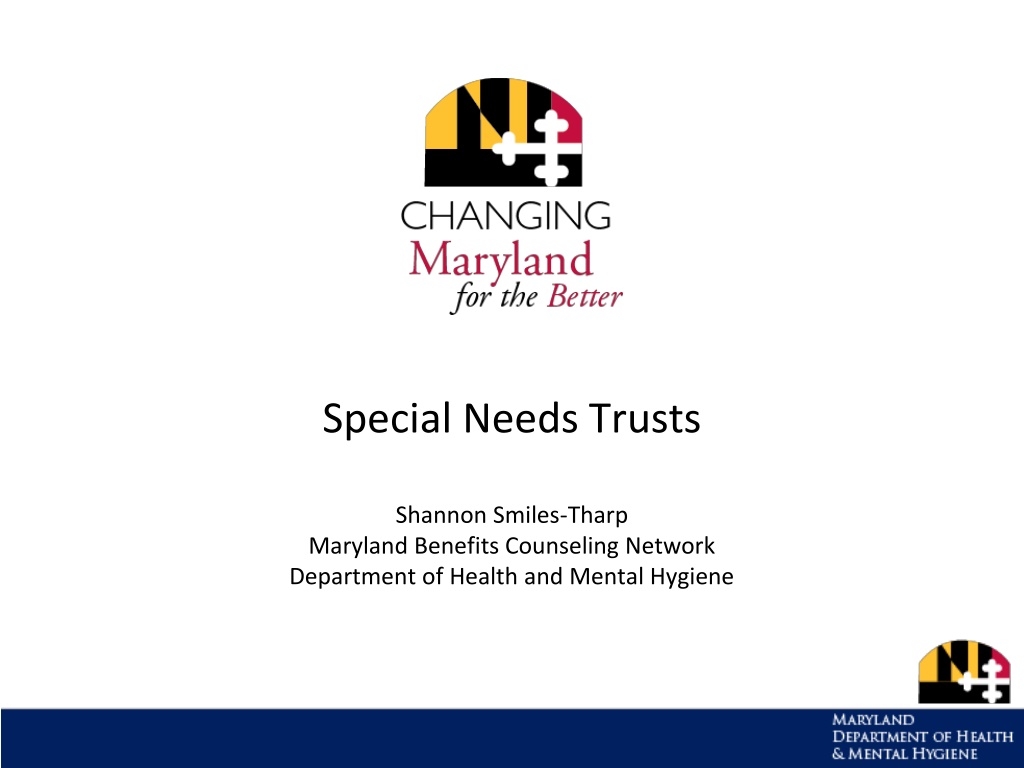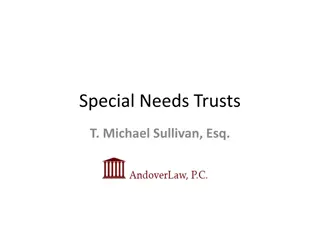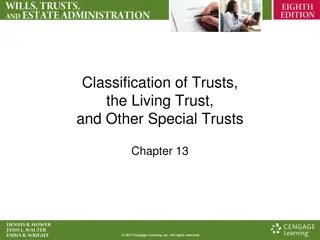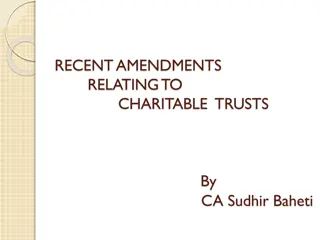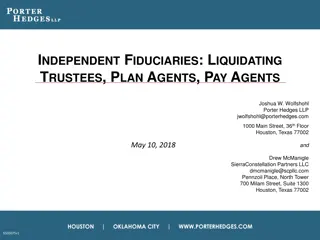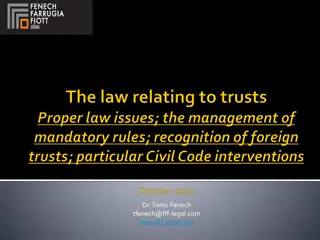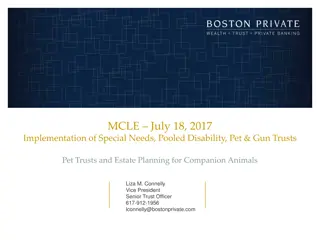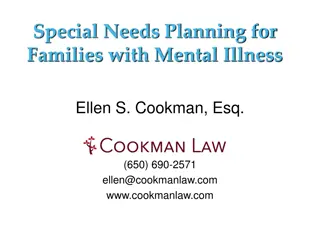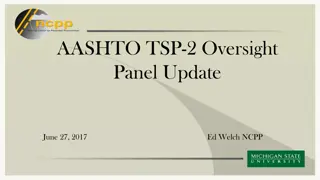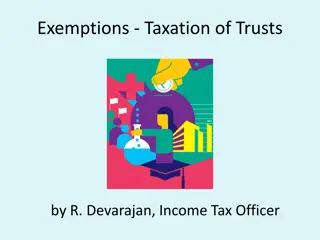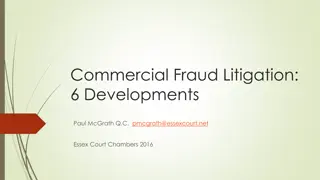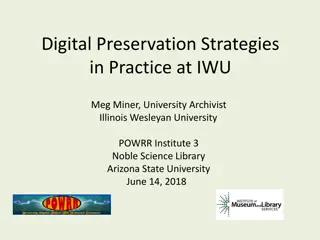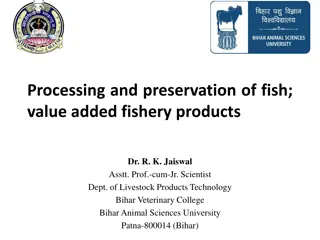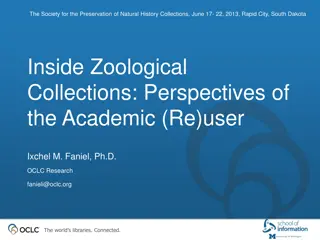Understanding Special Needs Trusts for Benefits Preservation
Special Needs Trusts, also known as Supplemental Needs Trusts, are set up to safeguard government benefits while allowing individuals with disabilities to benefit from contributed funds. Properly managed trust funds do not count as income or resources, helping to maintain eligibility for SSI, Medicaid, and other essential benefits.
Download Presentation

Please find below an Image/Link to download the presentation.
The content on the website is provided AS IS for your information and personal use only. It may not be sold, licensed, or shared on other websites without obtaining consent from the author. Download presentation by click this link. If you encounter any issues during the download, it is possible that the publisher has removed the file from their server.
E N D
Presentation Transcript
Special Needs Trusts Shannon Smiles-Tharp Maryland Benefits Counseling Network Department of Health and Mental Hygiene
2 Special Needs Trusts Overview Also called: Supplemental Needs Trusts Discretionary Trusts Special Care Trusts Set up to enable a person with a disability to benefit from money contributed by another party or his or her own funds without jeopardizing SSI, Medicaid or other need-based government benefits Trust is created so money belongs to the trust, not the individual (beneficiary) Trust requirements include: Must be irrevocable All trust funds must be used only to benefit the person with a disability Only the designated trustee can withdraw money from the trust
3 Do Trust Funds Count as Income or Resources? If the trust is established and managed properly, the money and/or property in it does not count as a resource Withdrawals from the trust ( disbursements ) do not count as income for SSI purposes if: They are not used to pay for food or shelter, AND The money is not provided directly to the beneficiary, AND Any items purchased are not countable resources
4 Do Trust Funds Count as Income or Resources? If withdrawn funds are given directly to the beneficiary, the money counts as unearned income. If withdrawn funds are used to buy an item that counts as a resource (e.g., a second car), the funds count as in-kind unearned income. If withdrawn funds are used to pay for food or shelter, they count as in-kind support and maintenance (ISM), subject to the presumed maximum value (PMV). The maximum countable value of this ISM is $240.33/month in 2014 (1/3 the SSI federal benefit rate for an individual).
5 Do Trust Funds Count as Income or Resources? Certain government benefits will count as income for SSI purposes even if they are directly and irrevocably deposited into a trust, including: Railroad Retirement Board-administered pensions; Veterans pensions and assistance; Federal employee retirement payments (CSRS, FERS); Social Security title II payments; and Private pensions under the Employee Retirement Income Security Act (ERISA)
6 Do Trust Funds Count as Income or Resources? Other types of payments (e.g., alimony or child support) that are directly deposited into a trust are NOT counted as income if the payments are irrevocably made into the trust, such as through a court order.
7 Creating and Managing a Trust A trust is created by a grantor . For most trusts, the grantor may be a: Parent Grandparent Guardian A person is named as the trustee for the trust. The trustee can be the grantor or another person. The trustee is obligated to spend funds from the trust only on expenses for the beneficiary the person with a disability whom the trust was created to benefit. A trust is usually created through either a will or trust agreement . The document specifies: The grantor The trustee The beneficiary How the trust funds should be spent on the beneficiary What will cause the trust to end What will happen to any funds remaining in the trust when the beneficiary dies
8 Kinds of Special Needs Trusts 1. 2. 3. Third-Party Supplemental Needs Trust Payback , OBRA or (d)(4)(A) Trust Pooled Supplemental Needs (or (d)(4)(c)) Trust
9 Third-Party Supplemental Needs Trust Created by a parent, grandparent, guardian or court Trust funds are never owned by the person with a disability; funds come from another person Funds in the trust are not counted as resources for SSI, Medicaid or other need-based government benefits Disbursements from the trust don t count as income for SSI, Medicaid, etc. if they are spent for the purposes for which a trust is created.
10 Third-Party Supplemental Needs Trust Disbursed funds may generally not be used for food or shelter (if the beneficiary receives SSI) or medical expenses covered by Medicaid (if the beneficiary receives Medicaid) Trust must be irrevocable in order for funds not to be counted as income or resources for SSI, Medicaid or other government benefits The beneficiary must be under age 65 when the trust is created. For Medicaid, deposits may not be made to the trust after the beneficiary reaches age 65.
11 Third-Party Supplemental Needs Trust For Medicaid, trust funds may be used for the beneficiary s health care, education, comfort, or support For Medicaid, trust funds may NOT be used to: Compensate family members of the beneficiary for any services they provide to the beneficiary Buy gifts Buy real estate other than a single family home in which the beneficiary will live. The trust needs approval of the state circuit court to invest more than $100,000 to buy a home. Buy life insurance on the life of the beneficiary
12 Third-Party Supplemental Needs Trust For Medicaid, trust funds may NOT be used to: Buy an annuity on the life of the beneficiary, unless: The final payment to the trust will be made before the beneficiary reaches age 65, and If the beneficiary dies before the final annuity payment is made, and Medicaid payback is required, then remaining payments will be made directly to the state Pay for the beneficiary s funeral expenses, BUT the trust may buy an irrevocable burial contract for this purpose
13 Third-Party Supplemental Needs Trust Requires an attorney to create Does not require approval by the Maryland Attorney General s Office, though Social Security and/or Medicaid may need to review the trust document to verify that trust funds should be excluded for SSI and/or Medicaid purposes
14 Third-Party Supplemental Needs Trust Two Types of Third-Party Supplemental Needs Trusts: 1. Testamentary Trust Created by a will Takes effect upon the death of the grantor The will can detail how the trust will be funded how much of the estate will go into it The will can be changed to alter the terms of the trust until the death of the grantor. Once the grantor dies, the trust can t be changed.
15 Third-Party Supplemental Needs Trust Two Types of Third-Party Supplemental Needs Trusts: 2. Inter Vivos or Living Trust Created by a trust agreement Funds can be deposited while the grantor is alive. Additional funds can be deposited from an estate through a will.
16 Payback , OBRA or (d)(4)(A) Trust Created by a parent, grandparent, guardian or court order Funded with assets owned by the person with a disability (from inheritances, life insurance proceeds, personal injury settlements, or other sources) Trust must be irrevocable in order for funds not to be counted as income or resources for SSI, Medicaid or other government benefits The beneficiary must be under age 65 when the trust is created.
17 Payback , OBRA or (d)(4)(A) Trust Trust funds can only be used for purposes allowed by state regulations. Trust funds can NOT be used to pay family members for care. Trust funds do not count as resources for need-based government benefits However, when the beneficiary dies, funds remaining in the trust are subject to Medicaid payback . The funds are used to repay the state for Medicaid expenses it has paid on the beneficiary s behalf, both before and after the trust was established.
18 Payback , OBRA or (d)(4)(A) Trust If any funds remain after the state has been paid, these funds are distributed to other beneficiaries called residual or contingent beneficiaries - specified in the will or trust agreement. Requires an attorney to create. The Maryland Attorney General s Office must review and approve the trust. If any funds are added to the trust after the beneficiary turns 65, they may be counted as income (in the month of receipt) and resources (after the month of receipt).
19 Pooled Supplemental Needs (or (d)(4)(c)) Trust Created and managed by a nonprofit agency to benefit a number of people with disabilities. Each person s funds are deposited in the trust, but each has a separate account. A single trustee invests and manages all the funds in the trust. A person with a disability (or another person with power of attorney for the person with a disability), parent, grandparent, guardian or court can set up an account.
20 Pooled Supplemental Needs (or (d)(4)(c)) Trust Does not require an attorney to create an account Initially funded with the beneficiary s own money, but others can later contribute their funds. Charges enrollment and administration fees
21 Pooled Supplemental Needs (or (d)(4)(c)) Trust If the beneficiary is age 65 or older: For SSI, he or she may be subject to a penalty - ineligibility for up to three years - for transferring assets into a pooled trust at or after age 65. For Maryland Medicaid, transfers can be made into a pooled trust at or after age 65 without penalties. When the beneficiary dies, the funds can either remain in the trust, OR be subject to Medicaid payback. If Medicaid payback occurs, any funds remaining after payback can be distributed to other beneficiaries as specified by the person who created the account.
22 Pooled Supplemental Needs (or (d)(4)(c)) Trust After the beneficiary dies, but before Medicaid payback, the remaining trust funds can first pay for these expenses: Taxes due from the trust to the State(s) or Federal government because of the death of the beneficiary; Reasonable fees for administration of the trust estate such as an accounting of the trust to a court, completion and filing of documents, or other required actions associated with termination and wrapping up of the trust. The Maryland Attorney General s Office must review and approve the trust.
23 Funding a Trust A trust may be funded with assets including: Cash Bank accounts Certificates of deposit (CD s) Stocks Bonds Mutual funds Life insurance Retirement accounts or pension plans Real estate Personal property
24 Funding a Trust Trust funds may be deposited: In a lump sum In an initial lump sum, followed by other deposits Through regular deposits, including through automatic transfers By making the trust the beneficiary of life insurance proceeds Etc.
25 Using a Trust to Pay for Housing A trust can own a home and trust funds can be used to pay for upkeep and maintenance of the home. A trust can provide a home for the beneficiary in a number of ways: By transferring the home into the trust while the grantor is alive, or upon his or her death By authorizing the trustee to buy a home with funds in the trust By using trust funds to pay for a down payment, closing costs, and/or mortgage payments Lend trust funds to the beneficiary for a down payment on a home Rent a home to the beneficiary
26 Using a Trust to Pay for Housing If the trust owns a house as a home for the beneficiary, it does not count as a resource to the beneficiary, even if she or he later moves out of the house. However, if the trust buys a home for a SSI beneficiary to live in, it counts as in-kind support and maintenance (ISM) to the beneficiary the month of purchase. The ISM is subject to the presumed maximum value (PMV). The maximum amount is 1/3 of the SSI federal benefit rate ($240.33 in 2014).
27 Using a Trust to Pay for Housing While the beneficiary lives in the home, she or he is considered to be living in his/her own home based on having an equitable ownership under a trust. If the beneficiary has such equitable ownership, then she or he is not considered to be receiving in-kind support and maintenance (ISM), even if she or he pays no rent, after the month in which the home is purchased. If the trust pays for mortgage payments, property taxes, rent or utilities, these payments will be counted as in-kind support and maintenance (ISM) for SSI purposes. This will reduce SSI payments by as much as 1/3 the SSI federal benefit rate ($240.33 in 2014).
28 Using a Trust to Pay for Housing If the trust pays directly for certain other housing expenses (e.g., telephone, cable or internet service; home renovations; home maintenance and repairs; furniture and appliances), it has no effect on SSI or Medicaid eligibility, or SSI payment amount. However, direct payments for most bills DO count as income for HUD rent purposes. If a trust pays for bills other than medical and dental expenses, the payments count as income.
29 Using a Trust to Pay for Housing For Medicaid, if the trust contains an asset owned jointly with another party, then when the trust terminates, either: A. The property must be sold for fair market value, or B. The other owner(s) must buy the trust s interest for fair market value.
30 Trustee The trustee s duties include: Managing and investing trust funds Filing tax returns for the trust Recording how trust funds are used Disbursing funds from the trust for expenses for the beneficiary, as specified in the trust The trustee may be a relative, friend, financial institution or lawyer.
31 Trustee A third party special needs trust or pooled special needs trust may be written to provide payment to the trustee from trust funds for serving as trustee. However, Maryland law prohibits a (d)(4)(A) trust from paying a trustee who is a family member. Should also choose a successor trustee in case the original trustee becomes unable or unwilling to continue
32 Finding an Attorney A list of Maryland attorneys who are skilled in creating special needs trusts can be found at: http://www.arcfc.org/userfiles/image//choosinganattorney2 013.pdf Several other Maryland attorneys and attorneys in other states can be found at http://www.specialneedsalliance.org/find-an-attorney/
33 Finding a Pooled Trust First Maryland Disability Trust - http://www.firstmdtrust.org Penn Mar Organization Courtney Miller, 410.343.1069 x291, cmiller@penn-mar.org Shared Horizons, Inc. - http://www.shared-horizons.org/ Plan of MD-DC, Inc. - http://www.planofmd-dc.org/ Arc of Northern Virginia - http://www.thearcofnovatrust.org/
34 Sources Planning Now: A Futures and Estate Planning Guide for Families of Children and Adults with Developmental Disabilities; Maryland Developmental Disabilities Council (http://md- council.org/publications/PDF/PlannGuide%20v10_FINAL.pdf) pages 48 - 54 SSI policies: POMS SI 1120.200 1120.203 Medicaid regulations: COMAR 10.09.24.08-2 (http://www.dsd.state.md.us/comar/getfile.aspx?file=10.09.2 4.08-2.htm)
